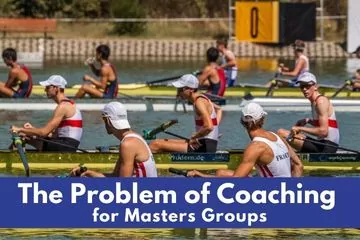
Compared to other groups, Masters rowers get far less coaching compared to other training groups. There are good reasons behind this, but it still makes you wonder why Masters rowers always seem to get pushed to the back of the line, so to speak.
Hi there! This is Rebecca, and today I want to address what steps can be taken to address the lack of coaching in Masters groups.
There are significant differences when it comes to coaching youth, colleges, and Masters rowers. Of course, maturity and experience count, but you won’t find many in the 50-plus age groups taking authoritarian coaching from a 30-year-old.
Practice schedules, training plans, and even goals are different for Masters rowers since these are adults who have other things going on in their lives, including school studies, children, jobs, etc.
Why are Masters rowers so lacking in coaches, and what can we do about this problem?
That is the subject of today’s article.
Where Are the Coaches?
In case you weren’t aware of it, rowers under the age of 18 cannot row unsupervised. This means that all youth groups must have a coach every minute that they are in the water.
This is the reason why clubs will allocate whatever funding (and it’s not much) they have for coaching to the youth rowers.
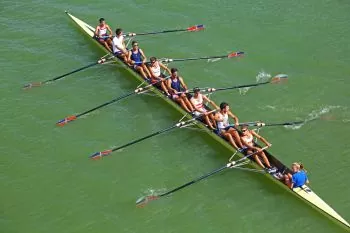
That makes sense in some ways, I understand, but if Masters are to improve on their skills, where is the coaching going to come from?
This is where peer coaching or self-coaching is going to come in handy.
Yes, if you are lucky, your club can do fundraising, or the club members can all pitch in and donate some cash so you can hopefully pay for professional coaching. However, if that doesn’t happen, we will have to make do with alternatives.
- Click Here to See My Top Tactics for Selecting Your Masters Lineups for Regattas!
Managing Expectations
When it comes to a rower’s expectations, performance is everything, and I do mean everything.
Younger athletes will respond to both their coaches’ instructions, and they will put pressure on themselves to perform better every time they hit the water.
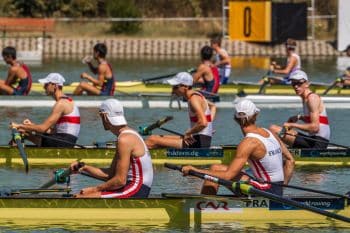
On the other hand, Masters rowers may not feel that kind of pressure. Yes, some of us are very competitive, and we train to win. However, others are in the club for camaraderie and physical fitness, and they may not expect to win or even try to improve.
As I mentioned earlier, I believe that many Masters rowers won’t take well to the typical authoritarian coaching that youth receive.
Coaches can be what is called traditional pedagogies, which means that the coach directs every aspect of training, learning, and development of skills. This is the type of coach that most youth rowers have.
The other end of the scale is what is called andragogical pedagogies. This is where coaches explain the proper way to do something, and then the remainder is left up to the athlete to self-direct.
Masters rowers need to understand that the coach is only connecting with them, not trying to control them.
Considering that Masters have a lack of coaching overall, I suggest that we look to peer-coaching and self-coaching to help with our goals.
A Strong Framework for Coaching Masters Rowers
If I had my way, the perfect means by which a club committee could set up a Masters group to have a great learning curve with minimum coaching is to have a strong learning framework.
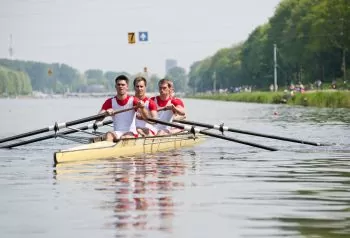
First, let’s consider the inputs to learning (this applies to more than just rowing, by the way):
- What is actually being taught?
- How are the lessons reaching the student?
- What is the frequency of repetition?
- What system is there for checking and testing that the lesson has been successful?
Whether we are talking about sweep rowing or sculling, the very first thing that rowers must understand is the stroke cycle, proper form, and the pattern of movement which they are trying to learn.
Then these learners must understand the difference between the action they are currently doing and the improved or desired action that they should be doing.
Peer coaching can work in these instances. Masters rowers who are fairly new to the sport can benefit from having another, more experienced Masters rower demonstrate the correct movement, then film the student. The video can then be reviewed by both.
Another option is online instructional videos. There are probably thousands of instructional videos that can be useful when other members are busy with another rower or are unavailable. Students can take notes or write questions to pose to more experienced members later on.
How to Master Self-Coaching
You might think that self-coaching is like talking to yourself and, in some ways, it is. However, habits die hard, and it may take you two thousand strokes to make one small technical change so talking to yourself sounds pretty mild, if you ask me.
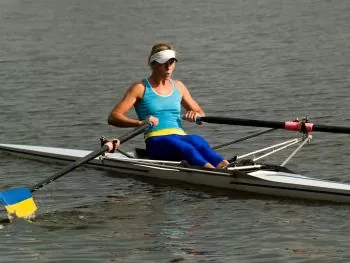
When it comes to self-coaching, you aren’t necessarily saying, “Way to go, Rebecca! Good job! 1,000 more meters, and you’re done!”
While I like the positive attitude, the point of self-coaching is to learn to do something new or to do something you already know how but learn to do it better.
First, make a decision that you will focus on no more than 2 points per training session. Don’t let yourself get overwhelmed. Make a list of everything you hope to accomplish, but then choose only two items from that list.
So, how do you go about coaching yourself on those two technical points?
- You will need to start by actively thinking about what change or action you are going to make. Not just for 5 minutes or the first 500 meters, but with every single stroke. Think about the change you are trying to make and then do it! This is called the conscious movement.
- Now, you will work on unconscious movement. Stop thinking about this new action you are trying to learn for a short period, say 5 strokes. Then go back to thinking about it again for the next 5 strokes.
- Once you’ve done that, you can stop thinking about your new action for 5 strokes but check and see if you’re still doing this new action correctly. If you are, then you can stop thinking about it for another 5 strokes. If you aren’t, then go back to step 2.
- Keep switching from thinking about the new action and not thinking about it. Try extending the number of strokes where you don’t think about the action until you are certain that it is now a habit.
Remember that this will only work if you know what change you are trying to make, and you successfully make it a habit.
Drills, Drills, and More Drills
Like everything else, practice makes perfect, and this is no less true when you are self-coaching.
Practice a new movement carefully and slowly. If this means that you spend an hour rowing at 18SPM, then so be it!
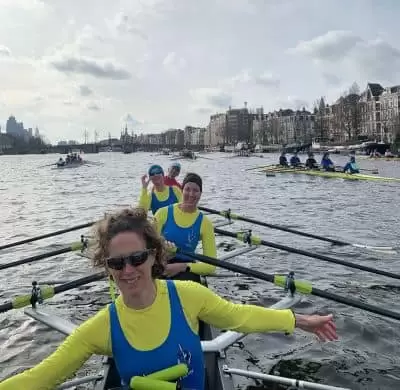
Doing the drill at least three times every outing is the best way to continue to improve.
Frequency is rewarded, my friends, so start doing a drill slowly but perfectly, then increase your stroke rate as you do it, and add some complexity to ensure that you have your new action in place as a habit.
At the End of the Day
To all Masters rowers, don’t be discouraged if you can’t find coaches to work with you. Instead, you can try peer-coaching and self-coaching until you can find one.
This may take some considerable time, but you can find one eventually if your club committee is as committed as you are.
While self-coaching may seem next to impossible, I assure you, it isn’t. Like anything else, this is a skill that may take some time to learn, but hey, how long did it take you to learn to row, ride a bike, or learn your multiplication tables?
Continue learning and finding solutions, Masters, and have fun rowing!
Written by Rebecca Caroe – RowingCrazy.com
Experienced Rower, Rowing Podcaster, Olympic Rowing Commentator & Expert Masters Rowing Coach
Rebecca Caroe is a masters rowing expert and a rowing coach. She is a rowing entrepreneur, has commentated for the BBC at London 2012 Olympic Games and is also a very well known Podcaster in the rowing world.



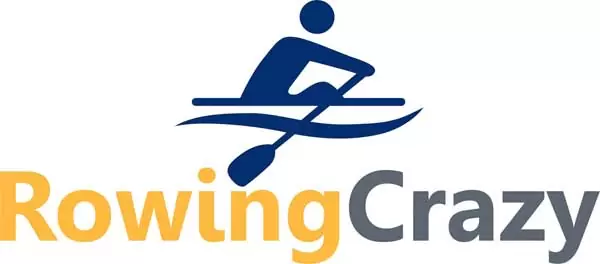
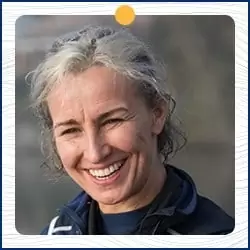

Pingback: How to Balance Your Rowing Training Without Losing Your Mind
Pingback: A Guide to Adapting Rowing for Masters Rowers | Rowing Crazy